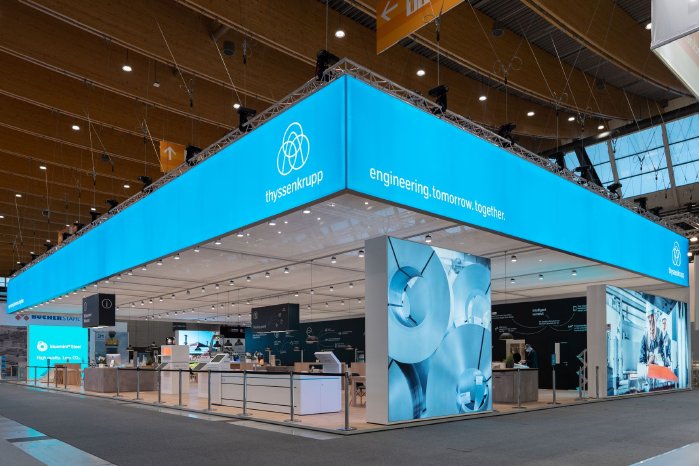bluemint® Steel comes into play where a large proportion of climate-relevant greenhouse gases are released: in the steelmaking process. At this point thyssenkrupp Steel is already using various processes to reduce the amount of coking coal used, thus cutting its CO2 emissions. These savings can be allocated to a specific product volume.
“We are launching bluemint® Steel to offer our customers certified products with reduced CO2 intensity as quickly as can be”, explains Bernhard Osburg, thyssenkrupp Steel’s CEO.
Two products, one goal: less CO2
Two variants are currently available: bluemint® pure is based on a process where part of the coking coal used in the blast furnace is replaced with already reduced sponge iron. This reduces both the specific emissions released at the Duisburg production site and the CO2 intensity of the steel produced in this way. bluemint® pure has a 70 per cent lower allocated CO2 intensity. This savings method has been verified and assured by the international certification body DNV and is consistent with the internationally accepted Greenhouse Gas Protocol.
bluemint® recycled is a high-quality scrap recycling product used in the blast furnace. This process also leads to a reduction in the use of coking coal and thus to real CO2 savings. In concrete terms, a saving of 64 percent is allocated to each tonne of bluemint® recycled. The corresponding certificate has been issued by TÜV Süd.
No compromises on the spectrum of grades
Customer benefit in two ways: They can continue to use thyssenkrupp Steel’s full product range while having the certainty to use steel with reduced CO2 intensity. Moreover, processors can credit the certified savings against their Scope 3 emissions and thus improve their own carbon dioxide balance.
After the launch of the product family, company Kaldewei was the first customer to place an order for bluemint® Steel. Kaldewei is a manufacturer of premium bathroom objects characterized by durability, circularity and luxurious surfaces. Kaldewei – renowned for its commitment to environment projects – thus takes a further step towards sustainability through the reduction of CO2 emissions. At the thyssenkrupp trade fair stand, the Westphalia-based company will show a selection of bathroom products made of bluemint Steel for the first time. They can soon be pre-ordered as a limited edition under the Kaldewei sub-brand nature protect.
The first bluemint® Steel products are another milestone in thyssenkrupp Steel’s decarbonization strategy. To achieve the goal to make its steel production climate-neutral by 2050 at the latest, the company will gradually replace its blast furnaces with hydrogen-fueled direct reduction plants. Commissioning of the first large-scale plant with melting unit is scheduled for 2025. The bluemint® product family will continue to grow as well.
The advantages of bluemint® Steel at a glance:
- CO2 intensity reduced by about 1.5 tonnes (70 percent) (bluemint® pure)
- CO2 intensity proportion reduced by about 1.35 tonnes (64 percent) (bluemint® recycled)
- Primary steel, all qualities possible
- Directly creditable against the Scope-3 emissions of our customers


